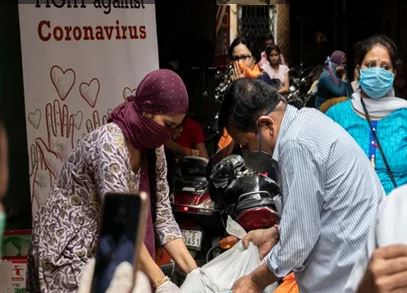NGOs and the fight against COVID-19

Non-governmental organizations (NGOs) have actively involved in combating various challenges associated with environment, education, poverty, women empowerment, children, social issues, human rights, etc., to make the world a better place for every human being. However, their role became more prominent with the outbreak of COVID-19 pandemic as thousands of them engaged with the fight against the situation across the world through a set of diverse initiatives some which are described below, providing evidence of NGOs’ significant contribution.
The fight against COVID-19 has been a collaborative effort in which governments, individuals, businesses, and civil society organizations are cooperating to save the lives of humans, support families, and in general, do their best to serve every member of the community unconditionally. During these unprecedented times, the contribution of NGOs became more paramount in combating the virus and its impact on societies’ most vulnerable populations, particularly in countries and regions which needed more assistance to deal with the situation by performing several major roles.
According to Times of India (2021) one of the basic roles of NGOs is providing basic amenities as many people, including the elderly and children, persons with disabilities, transgenders, the homeless, daily wage workers, migrant workers, and urban poor families across the world, including India as a good example, have had the NGOs as their only point of reference during the pandemic. The distribution of food boxes to those in need in Thailand and in-service training for teachers where food was also distributed to needy communities in India are some instances highlight the fight against poverty (Reliefweb, 2020). Another Indian NGO, Hindrise, is extending on-ground support to sufferers and their families who failed to manage the basic requisites for fighting against the pandemic. Distribution of daily free food packets to Covid patients and their family members in the backward communities of Sitamarhi Bihar, Delhi NCR, and other states of India along with meeting the rapid Covid lockdown-induced food demands of the abandoned and homeless ones, daily wage laborers, migrant workers and other vulnerable populations in different parts of Bihar and Delhi NCR region are some initiatives taken by the NGO (Hindrise, 2020).
While most people’s lives and work have been negatively affected by the crisis, women’s jobs and livelihoods are more vulnerable to the COVID-19 pandemic (Madgavkar et al., 2020). NGOs have focused on the protection of women through operating a women’s shelter in Barbados, working against gender-based violence through new technologies in Uganda, assisting new mothers and mothers-to-be through NGOs such as Mame Pentru Mame in Romania, creating awareness and assisting violence-exposed women in India, and holding courses at the center for marginalized girls in Côte d’Ivoire as some instances (Reliefweb, 2020).
The COVID-19 crisis has exacerbated the discrimination and exclusion already faced by individuals and communities. Anxiety and fear about the virus during the current emergency have led to various forms of social stigma, discrimination, and stereotyping. The fight against discrimination has been done through several initiatives such as Videos made available on the social stigma surrounding the community during COVID-19 in South Africa and providing help to transgender groups in India by providing them with livelihood items. As social stigma can be a barrier to the COVID-19 response resulting in exposure to health risks, harassments, discrimination and isolation, there have been some efforts to include isolated and marginalized populations through the creation of a sustainable, offering psychological help, and performing acts of solidarity to fragile communities (Reliefweb, 2020).
According to UNICEF (2021), Stigma can be heightened by insufficient knowledge about how the novel coronavirus disease (COVID-19) is transmitted and treated, and how to prevent infection. Therefore, transmission of trustworthy information about health is a priority, resulting in various initiatives to increase public awareness through training programs on health and the prevention of COVID along with awareness campaigns in countries such as Nigeria, Bangladesh (reliefweb, 2020), India (Hindrise, 2020), creating podcasts to help people to know that Covid-19 is real and how to avoid it in Uganda, Nairobi, North Kivu (bond.org, 2020) and many other places. The mass awareness campaign by Hindrise Social Welfare Foundation is another example supporting millions of adolescent girls, boys and young women in Indian villages to raise awareness on how to prevent the rapid spread of Coronavirus (Hindrise, 2020).
Through the wide set of different initiatives contributing to the exploration of new and innovative responses to the global crisis, NGOs have established an effective network of solidarity with the support of other civil societies and particularly with the help of UNESCO and their shared values to serve the humanity.
References
Anu Madgavkar, Olivia White, Mekala Krishnan, Deepa Mahajan, and Xavier Azcue (2020). COVID-19 and gender equality: Countering the regressive effects. https://www.mckinsey.com/featured-insights/future-of-work/covid-19-and-gender-equality-countering-the-regressive-effects
https://reliefweb.int/report/world/exploring-new-and-innovative-responses-crisis-ngo-solidarity-during-covid-19, 2020
https://timesofindia.indiatimes.com/blogs/voices/the-role-of-ngos-ensuring-commitment-to-social-responsibility-amidst-the-covid-19-pandemic/2021
https://hindrise.org/resources/role-of-ngo-in-combating-covid-19-pandemic/, 2020
https://www.unicef.org/sudan/covid-19-stigma-how-prevent-and-address-social-stigma-your-community, 2021
https://www.bond.org.uk/news/2020/06/12-ways-ngos-are-helping-the-worlds-poorest-during-covid-19, 2020

